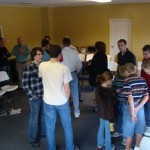Examples of Mutual Edification when the Church Gathers
Last week, I wrote several posts on the topic of “mutual edification.” The series (which wasn’t really planned as a series) began with a post called “A structure that emerges naturally based on the people involved” in which I commented on a passage from one of my favorite books. Then, I wrote “About edification, mutual edification, self- or solo-edification,” defining the various types of edification and examining why type Paul says should take place when we gather with other believers. In the next post, I discussed “The role of leaders and mutual edification.” Finally, I asked (and answered) the question, “What if mutual edification is not allowed?”
A Facebook friend (GeorgiaAna) shared my post on leaders and mutual edification with her Facebook friends (see the share and comments here.) In the comments that followed, GeorgiaAna made a great observation and a request:
I was also hoping you’d be inspired to give some examples. I know that examples can be turned into patterns to cut and measure by — but they’re helpful to some learners in getting the ideas cemented into a usable form. It’s all a struggle to maintain that balance that is authentic edification without manipulation, and too few speak about it.
Over the last few days, I’ve been thinking about her request and the benefits and dangers of examples. I’ve decided to share some examples, but I want to start with a couple of caveats.
1) I can only share examples that I have taken part in, and I can only share them in a general way. Whenever we get together, different things happen, different things are said, different people speak, etc. I cannot tell you what will happen next Sunday when we gather together (or anytime this week we get together with brothers and sisters in Christ). So, remember, these are general examples.
2) Like GeorgiaAna stated, I am not sharing these examples to be turned into forms or methods for others to emulate step by step. Instead, I’m sharing these examples as ways that God has worked (and continues to work) through a group of believers in order for us to serve one another to build each other up and to mature as a group. God will probably work through other groups of believers in different ways because the believers are different.
So, with that stated, I’ll share a few ways that we mutually edify one another.
As a group, we have decided to study through a book of the Bible together. (However, between books we often do topical studies.) For example, we’re currently studying through Ephesians. We’ve also decided as a group that it works best for us for someone to facilitate each week’s study. That person changes from week to week, and that person is not responsible for doing all of the teaching. In fact, we know that we are all responsible for studying the passage and for teaching one another. During this time of teaching/discussion, many people will take part as we work through the passage. The “facilitator” helps us stay on track, but does not attempt to control the meetings. For example, last Sunday we had planned to work through 16 verses, but we spent half of our time on the first verse. And, we stayed there because so many people were being encouraged and challenged by what was being shared.
We also attempt to mutually edify one another in the way that we sing. Whenever we sing together, different people can request songs. Often, the person who requests that we sing a song together will explain why they want to sing that song. Also, often, after we sing, someone (or more than one person) will comment on the lyrics. In this way, singing becomes less about the music and entertainment, and much more about considering the lyrics and how they reflect our lives with Christ.
In praying, we also seek to build up each other. It’s hard to say exactly when we pray when we gather together. Sometimes we have an extended prayer time at the beginning of our gathering, sometimes at the end, and sometimes scattered through our time of being together. We always have an open time of sharing requests, praises, thanksgivings, etc., and open times of prayer, where many people can take part. I’ve noticed that people often minister to one another as a result of this prayer time after we have stopped praying.
One of the most important aspects of gathering together is eating together. We’ve decided to eat together at the end of our gathering. We don’t have a formal meal. Instead, each family brings food for their family. Others, who don’t bring food, run out to fast food restaurants to pick up some food. Then, others, share food that other families bring. Everyone who wants to stay is always welcomed (and invited) to stay and eat, even if they didn’t bring food. This time around the table is important in continuing conversations from the prayer, Bible study, etc. as well as further discussing and sharing what’s going on in each other’s lives.
Then, finally, there is so much time of just hanging out together. We’re not a stickler for starting or stopping at a certain time. And, as we start gathering together, we’ll often spend extended amounts of time just talking with one another. The same thing happens after we eat together. We’ll often continue talking with one another hours after we’ve finished eating.
These are a few of the examples of how we mutually edify one another when we gather together. (I’ve mostly described our scheduled weekly gatherings.) However, there’s another absolutely necessary element that I’ve talked about yet. What’s that? This Sunday gathering is not the only time that we see one another during the week. For most of us, we spend time together several other times during the week, and these times of gathering together are just as important in mutual edification as our Sunday gathering.
I’d love to hear other examples of how you seek to mutually edify one another when you gather with the church.
What if mutual edification is not allowed?
For the last few days, I’ve published several posts about the important of mutual edification when the church gathers together. I think this (i.e., mutual edification) had in mind when Paul wrote, “When you come together… let all things be done for edification.” (1 Corinthians 14:26 ESV)
This type of edification is not the work of one person or even a small group of people among the church. Instead, mutually edification is a work of the whole church helping one another grow in maturity in Jesus Christ. Neither solo-edification (one person building up others) nor self-edification (one person building up him or herself) is the same as mutual edification.
However – and let’s be honest – usually when believers gather together, they are not allowed to take part in the work of building up one another. Instead, a person (or group of people) in an official capacity decide who can or who cannot take part in the gathering of the church. In other words, in many (perhaps most) cases, most followers of Jesus Christ are not allowed to take part in mutual edification in most church gatherings, even if they wanted to.
So, what should these people do, assuming that they want to take part in mutual edification? Is it best to ignore the leaders’ plans and interrupt the service in order to take part? No, probably not. Is it best to remain passive and not work to build up the church? No, that’s not best either.
My suggestion is to begin with prayer, study, and examination of your own motives. Then, speak carefully and humbly with the positional officials, explaining your concerns.
But, remember this: mutual edification can and should take place any time we gather with other believers. If it cannot take place in one gather, then gather in another location or on another occasion. What do I mean? I mean invite a few close friends to your house or to a restaurant or to a coffee shop or to a park. Explain that you need to hear from them – you want to know what God is doing in their lives – you want to learn from what they’re going through. And, of course, you should seek to help them grow as well.
It is not your responsibility to convince everyone that you are correct. So, explain your position / concerns, but then live in the way that God is calling you to live. Begin to both teach and learn from your brothers and sisters in Christ whenever you are with them. Speak to them and listen to them. Sacrifice your own plans in order to join others in their life.
Are you getting together with one other brother or sister in Christ? Then build each other up. Are you gathering with just a few? Then edify one another. Are you having lunch with some other believers? Encourage each other.
Like Paul said, “Whenever you come together… let everything be done for edification.” If you can’t build up each other in one meeting, then get together at other times.
The role of leaders and mutual edification
When the church gathers together, Paul says that everything should be done for edification. And, previously, I’ve argued that the kind of edification that he’s talking about is “mutual edification.” I defined mutual edification as all (or many) working together to help all grow together in maturity in Jesus Christ.
Now, when we study most church gatherings today, we find something different. Instead of all (or many) working together to edify everyone, we typically find one, two, or at most a few leaders working to edify everyone. As I’ve mentioned before, this is a form of “solo-edification,” not mutual edification.
But, we know from Scripture that there were leaders among the earliest churches. So, what would be the role of these leaders when the church gathers if it was not to do the edifying?
In the New Testament, leaders were not chosen based on their spiritual gifts, and they were not place in positions of authority. Instead, leaders were recognized because they were exercising whatever gift God had given them, and because they were more mature (while still maturing) followers of Jesus Christ, and because they were good (living) examples for others to observe and imitated in life, faith, service, etc.
Thus, these leaders would certainly be edifying others when the church gathers together, using whatever gifts that God gives them as well as working through other opportunities that God provides (i.e., gifted teachers are not the only Christians responsible for teaching). However, this is not the extent of their leading. Why? Because while it is important for leaders to edify others, if all they do is edify other then they are several things missing from their role as leaders during the gathering of the church: 1) they are not allowing others to edify them (part of the “mutual” aspect of mutual edification), 2) they are only teaching others to be edified and not teaching them to edify, and 3) they are not providing examples of what it means to be edified by others.
So, while leaders should certain edify others, they should also allow themselves to be edified by others. This is important both for the continued growth and maturity of the leader(s) as children of God and followers of Jesus Christ. But, it’s also important for the continued growth and maturity of the whole church. Unidirectional edification (i.e., edification that is only done BY the leaders) is not as healthy for the church as mutual edification (i.e., edification that is done by the whole church).
There’s another way to think about this. Someone who feels he/she must be in control of a church gathering or who must be the one speaking, teaching, preaching, whatever, then that person is not actually leading in the way that leading in described in Scripture. This is true even if that person has be placed in some type of leadership position.
A leader among the church will both edify the church and will give plenty of opportunities for others to edify the church as well.
A structure that emerges naturally based on the people involved
As I mentioned a few weeks ago, I’ve been re-reading one of my favorite academic books on the church: Paul’s Idea of Community by Robert Banks (Peabody: Hendrickson, 2004). I recently came across one of my favorite sections of this book, and I realized that I have not written about this particular topic in a while.
You see, when it comes to the church – and especially to gathering together with other believers – structure often takes center stage in any discussion. We tend to focus on questions like these: What should happen when we gather together? Who should speak when we gather? What order should things happen in? What if something goes wrong?
These are all questions related to structure. And, I think that Banks’ approach would help us deal with these kinds of questions any many others.
He writes:
So then, provided certain basic principles of teh Spirit’s operations are kept in view: balance, intelligibility, evaluation, orderliness, and loving exercise, Paul sees no need to lay down any fixed rules for the community’s proceedings. There is no one order proper for its meetings; any order is proper so long as these criteria are observed. Paul therefore has no interest in constructing a fixed liturgy. This would restrict the freedom of God’s communications. Each gathering of the community will have a structure, but it will emerge naturally from the particular combination of the gifts exercised. (page 105)
Interestingly, I’ve found that today’s concerns regarding gathering with believers are rarely the same as Paul’s concerns. Oh, we care about “orderliness,” but we define “orderly” in a different way than what Paul described when he used that term.
And, “any order is proper”? That seems so strange to us. No fixed liturgy? (Yes, some do not use the term “liturgy” but prefer the term “order of service.”) That seems strange to us to.
No one wants to “restrict the freedom of God’s communications.” But, when we realize that God chooses to speak to his children through each other, we recognize that we are limiting God’s communication when we limit who is allowed to speak.
In other words, like I said before, our concerns are much different from Paul’s concerns. By setting aside Paul’s concerns, we may create a nice, ordered (not orderly, but ordered) meeting, but we miss much of what God is communicating to us.
So, what kind of structure do we find in the church gatherings in Scripture. Well, Banks ends his statement above with this: “[B]ut [the structure] will emerge naturally from the particular combination of the gifts exercised.” And, the gifts are exercised by God people. The structure, then, emerges naturally through the people who are gathered together as God directs them to serve one another while they are gathered together.
This can’t be planned. It can’t be orchestrated. It can’t be predicted. It can’t be charted.
Like Banks says, it emerges naturally. Or, perhaps it would be better to say, it emerges supernaturally.
To know the love of Christ that surpasses knowledge
If you’ve read this blog over the last few weeks, then you know that we’re currently studying Ephesians together when we gather on Sunday mornings. So far, we’ve made it through chapter 3, finishing that chapter last weekend.
I almost didn’t get together with the church yesterday morning. I’d been sick for a few days, and earlier that morning I had spent a couple of hour with my daughter at a race. We had been asked to write a story and take photos for the local paper.
Although we had alot of fun at the race, when I left I just wanted to climb in bed and sleep. But, at the last minute, I decided to go along with my family. Plus, the ham and bean soup that Margaret had made to share with our friends smelled delicious, and I was ready to dig into it.
I spent most of the morning listening… which is strange for me. I like to talk, and often I talk too much. Yesterday morning, I listened. I didn’t even feel like singing, mostly because my throat was a little scratchy.
Whenever I listen, I learn… and this time was no different. I loved hearing my brothers and sisters summarize the first couple of chapters of Ephesians and then work their way through Paul’s prayer at the end of Chapter 3:
For this reason I bow my knees before the Father, from whom every family in heaven and on earth is named, that according to the riches of his glory he may grant you to be strengthened with power through his Spirit in your inner being, so that Christ may dwell in your hearts through faith—that you, being rooted and grounded in love, may have strength to comprehend with all the saints what is the breadth and length and height and depth, and to know the love of Christ that surpasses knowledge, that you may be filled with all the fullness of God. Now to him who is able to do far more abundantly than all that we ask or think, according to the power at work within us, to him be glory in the church and in Christ Jesus throughout all generations, forever and ever. Amen. (Ephesians 3:14-21 ESV)
At one point, one of my good friends made a statement about a phrase in Ephesians 3:19 – “to know the love of Christ that surpasses knowledge.” Paul prays that the Ephesians have the power to know something that cannot be known. That “something,” of course, is the love of Christ. Paul wants them to know the love of Christ, and says that the love of Christ is beyond knowing.
This led to a great discussion, and, apparently, quite a bit of meditation and thought for several of us. I, for one, am glad that I was not able to speak as much as normal. It gave me the opportunity to think more about this… to think more about something that can’t be thought about.
The love of Christ is something that we are to know… to think about… to live. And, yet, we will never know it.
Of course we’re not igoring the people… we’re singing and preaching to them!
My friend Dan at “Some Church Stuff” wrote another thought-provoking post called “Search: Go To Church Ignore.”
His post was inspired by a search string that landed someone on his site: “go to church ignore.” In the post, Dan answers the question, “What can be ignored when we ‘go to church’?” Then, he follows it up with a question/answer of his own: “What do people usually ignore / not ignore when they ‘go to church’?”
Here are his answers:
Here’s a list of what I think is ok to ignore at church:
- Sermons
- Music
- Tithes/Offering
- People’s clothes/hair/jewelery
- The pastor’s coffee breath
- The beautiful decorations and flowers
- The Christian and American Flags
And probably what you shouldn’t ignore:
- The other people
Now here is what people usually don’t ignore:
- Sermons
- Music
- Tithes/Offering
- People’s clothes/hair/jewelery
- The pastor’s coffee breath
- The beautiful decorations and flowers
- The Christian and American Flags
And what they normally do ignore:
- The other people
Make sure you jump over to Dan’s post so that you don’t miss anything.
But, you know, in reality, most people would disagree that they ignore “the other people” when they “go to church.” In fact, don’t we do singing and preaching because of the other people?
But, that kinda misses the point. Doing things for an audience of “the other people” is not the same thing as listening to, learning from, caring about, and sharing life with “the other people.”
What do you think? What would happen among churches if we actually didn’t ignore “the other people”?
A typical atypical gathering with the church
No, the title of this post is not a mistake. Occasionally, I like to describe one of the times that we gather together with our brothers and sisters in Christ. People usually like these posts, especially people who are interested in more simple types of gatherings, but have little or no experience with it.
But, there’s a problem. All of our weekly gatherings are different. I mean, there are some “typical” elements or activities, but every meeting is atypical is some way. Still, I thought I would describe one of our recent gatherings for those who may be interested.
Our meeting time begins at 10:30 a.m., which means that is when people start to arrive. The first ones who arrive begin arranging the chairs and hanging out, catching up with each other, talking about what has happened since the last time they’d seen each other. As more and more people arrive, there are usually little groups scattered around the room, with people moving from group to group to talk to different people.
On this particular day, a couple who I had met online met with us for the first time. They were traveling through our area and spent the day with us. They told us about their service to prisoners in their area and their plans to start a halfway house in another state.
After they talked about their service to prisoners, we began sharing prayer requests and praying for each other. It’s always encouraging and challenging to hear what’s going on in everyone’s lives, and to see people truly caring for one another, both by praying and by making plans to help each other later. At one point, a brother shared a passage from Psalms that God had used to convict him about his attitude during the last week. Again, we prayed for him and for one another.
We had previously decided to begin studying Paul’s letter to the Ephesians this week. So, we were going to read through the entire book for our first week studying Ephesians. A couple of people would read each chapter, then between chapters someone would request a song that we would sing together.
After 10-12 people had taken turns reading through Ephesians, and after we sang 6-7 songs, a few people shared their thoughts from the reading. They each focused on different passages, and others joined the discussion, encouraging each other from the Scriptures. As we wound down, we decided together that we would continue studying through the book of Ephesians one or two paragraphs per week, beginning with Ephesians 1:1-14 the next time we get together.
But, even then, we were not finished gathering together. We continued to hang out and talk with one another for a long time. At this time, we also usually set up tables for lunch. But, because of a few things that were going on, we decided to eat lunch with several of our friends at our home. So, after talking for another hour or so, we went to our house to share beef and vegetable soup.
Unfortunately, I can’t share everything that happened that day. The more important things that were said and done are too personal to share in public (both for me and for others involved). But, hopefully, this will give you an idea of what happens during a typical atypical weekly gathering with our brothers and sisters in Christ.
Guest Blogger: What God is doing among the body in our area
I’ve invited people to write “guest blog posts” for this blog. There are several reasons for this: 1) To offer different perspectives. 2) To generate even more discussion and conversation between blogs. 3) To introduce other bloggers to my readers.
(If you are interested in writing a guest blog post, please contact me at aknox[at]sebts[dot]com.)
Today’s post was written by Dan House. You can connect with Dan via his blog or Twitter (@dan_house73).
——————————————-
What God is doing among the body in our area
I desire to continually stay open to finding and meeting brothers in Christ as the Spirit leads. I feel directed to tell you about what Christ has been doing here in Concord NC. There are 3 loosely associated gatherings here in Concord. One meets in the home my family and I live in and another meets about 2 miles away and another about 10 miles away. They all are gatherings that take place in homes.
I can only give you a snap shot of what I have been told and experienced along this path that Christ has us on. I will go back to 13 years ago when a couple of brothers from a large church in the area began asking questions about what they saw in the New Testament about Church. They eventually were asked to stop asking questions and to fall in line and get with the program or leave. Division was not the heart of these brothers so they changed there behavior and tried to bring unity. They quit asking questions and simply fell in line, but it seemed that was not good enough and they were eventually asked to leave.
They began meeting together asking questions and digging for truth. People were added and the group that was assembling faced many issues. The Holy Spirit did much. As you must already know body life is messy, but rewarding. I came in contact with a brother from this body’s assembly at a homeschool soccer game. The church that my family and I attended was ending. When the church added a permanent pastor it made a turn toward the end. I stayed till the church shut down.
This church’s planting and ending, caused me to have many questions. I began reading and digging for truth for the first time in my life. I began reading the bible, books by Watchman Nee, Frank Viola, and T. Austin Sparks. I began reading many blogs as well. I also began meeting with my new found friend and his friends for breakfast. When it became apparent that God was establishing another gathering we began meeting together. My new found brothers began to encourage us to keep pursuing.
The body here in Concord is not without a head pastor; our Head is Christ! We are not Fatherless, we have God as our father, but we have not seen fathers among us. We are looking for fathers in the faith. I am not saying that there are not fathers in the faith here in the area; there may be but, we have not made contact yet.
Well, I guess this is all I am able to write right now! I pray that you see my heart and not my inability to express my heart with words on page.
Replay: Dialog during the meeting of the church
About five years ago, I wrote a post called “Dialog during the meeting of the church.” At that time, I was just beginning to study and explore what the New Testament authors wrote about the church as the believers gathered together. The more I studied, the more I recognized that what they described looks completely different than the way believers typically gather together today. For example, even their methods of teaching were different, relying primarily on dialog instead of monologue. This post begins to explore some of these descriptions and the questions raised by those passages.
——————————————
Dialog during the meeting of the church
Many times, when considering the concept of speaking or teaching within the context of the meeting of the church, believers focus on the exhortation of Paul to Timothy: “Preach the word!” We have our modern definitions of preaching – too many to mention here – and our modern methods of preaching – again, too many to mention. But, I’ve read very few studies from a scriptural perspective into how believers actually spoke to one another or taught one another when the church gathered together.
There are two Greek verbs that are usually translated “preach” in English translations of the New Testament: κηρύσσω (kerusso) which means “to announce or proclaim aloud” and εὐαγγελίζομαι (euangelizomai) which means “to bring or announce good news”. Interestingly, in spite of the fact that these verbs and the nouns associated with them are used many times in the New Testament, there are very few occurrences (if any) where the specified audience consists of believers.
So, what verbs are used in Scripture to indicate the type of speech that occurs when believers meet together? Well, primarily, the biblical authors simply use the verbs that mean “to speak” or “to say”: λέγω (lego), λαλέω (laleo), etc. These verbs indicate that verbal communication was happening, but they do not reveal much about the method of communication.
However, there is another very interesting verb that is also used often in the context of believers speaking to one another when the church meets, and that is the verb διαλέγομαι (dialegomai). This verb means something like “to converse, discuss, argue, esp. of instructional discourse that frequently includes exchange of opinions”.
In Acts 19:8, Paul “reasoned” (ESV) (διαλέγομαι – dialegomai) with the Jews in the synagogues, but in Acts 19:9, after he left the synagogue, he continued “reasoning” (ESV) (διαλέγομαι – dialegomai) with the disciples who followed him to the hall of Tyrannus.
In Acts 20:7-10, Paul “talked” (ESV) (διαλέγομαι – dialegomai) with the believers in Troas on the first day of the week. This is the time when Paul continued speaking until midnight and the young man fell out of the window. But, what we don’t generally see from our English translation is that Paul’s “speech” could also be called a “discussion”.
There are other instances in the NT where the verb διαλέγομαι (dialegomai) is used to describe Paul or another believer “discussing” or “arguing” with nonbelievers. In these instances, the verb is almost always translated “reason”, “argue”, or “discuss”.
I wonder what would happen today if those who teach and speak to believers when the church meets used methods of discussion and dialog instead of the normal monologue method…
Edification requires Consideration
Eric at “A Pilgrim’s Progress” asks a very important question in his post “Are Different Things Edifying for Different People?” He answers his own question with, “Yes!”
In his post, Eric focuses on the differences between people. And, people are different, both in their backgrounds and understandings and maturity, but they are also different in what they are currently going through in their life.
Because of these differences, Eric makes the following statements:
Since we are different people, we Christians likely are edified by different activities in different amounts, different ways, and in differing occasions. This can even vary from time to time for the individual. It certainly varies between people.
In light of these differences, church gatherings should have a great deal of variety to them. In the busyness of life it is easy to fall into the trap of the routine. Regardless of how churches tend to gather, they can end up doing the same things gathering after gathering. This may be edifying for some, but others may feel starved.
I agree. In fact, not only do I agree that different things are edifying to different people and that these different ways to edify are best brought out through different people serving and speaking when we gather together, I also think that different things are edifying to different people at different times. In other words, as people change, that which builds up (edifies) changes as well.
Now, don’t misunderstand me. Only those things which point back to Jesus Christ and encourage others to follow and trust him are edifying. However, there are many, many ways to point people to Jesus and to help them follow and trust him. And, for different people at different times, some things are more or less edifying.
One of my favorite passages related to gathering with other believers points to this:
And let us consider how to stir up one another to love and good works, not neglecting to meet together, as is the habit of some, but encouraging one another, and all the more as you see the Day drawing near. (Hebrews 10:24-25 ESV)
If you read these verses in context (Hebrews 10:19-25), you’ll see that “considering one another” is one of the responses to the fact that we now have direct access to God through Jesus Christ. But, also notice that “considering one another” is the prerequisite (if you will) for gathering to encourage one another. Why must we “consider one another”? Because we are all different and because that which encourages/edifies may be different as well.
Are you considering one another and ready to encourage one another in whatever one another needs when you gather together?









